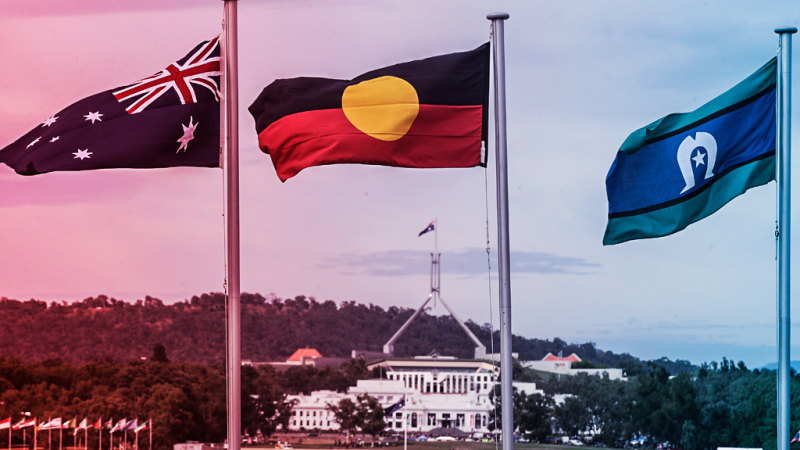Save articles for later
Add articles to your saved list and come back to them any time.
Key points
- Support for the referendum surrounding the Indigenous Voice to Parliament has fallen to below 50 per cent.
- When asked about the specific “yes or no” question that will decide the referendum later this year, the No side leads 53 to 49 per cent.
- Prime Minister Anthony Albanese has rejected calls to amend the proposal before the Senate votes on the wording of the question in the referendum bill.
Support for the Indigenous Voice has fallen below a majority on the Yes or No question that will decide the referendum, dropping from 53 to 49 per cent ahead of a crucial Senate decision on the wording of the change to the constitution.
Voters have swung against the proposal for the third month in a row and are backing the No case in three states – Queensland, Western Australia and South Australia – when asked about the federal government’s proposed question.
An exclusive survey shows that support for the Voice is at 56 per cent in Victoria and 53 per cent in NSW but this is outweighed by powerful swings that could block the reform gaining the required threshold of a majority of votes in a majority of states.
Prime Minister Anthony Albanese has rejected calls to amend the Voice proposal before the Senate votes on the wording of the question in the referendum bill this fortnight, cementing the plan for a public vote later this year.
The survey, conducted for this masthead by Resolve Strategic, shows that 42 per cent of voters support the Voice and 40 per cent oppose it when asked about the government proposal for change, with another 18 per cent undecided.
When asked a second question that only allows a Yes or No answer akin to the referendum, and using the exact wording put forward by the government, 49 per cent support the change but 51 per cent are opposed.
The Resolve survey is the first major poll to show No has a majority and the first to show three states have shifted to the No side.
Resolve director Jim Reed said the debate had reached a “tipping point” where advocates for the change were failing to gain a national majority and could not gain a majority of states.
“The No voters report being more committed in their choice than the Yes voters,” he said.
“This tells us that those people who have moved to No are locking in behind that choice, whereas the remaining Yes voters are wavering.
“Almost all voters have now heard of the Voice, but only 30 per cent say they could confidently explain it to someone else. This suggests that the more people hear about the Voice the more they are voting No, and not understanding the detail is likely a part of that.”
“The Yes vote has gone from 58 to 49 per cent over three months, so when we combine the survey tracks to break the results down by state it’s actually understating where the No position is now,” said Reed.
The objections are strongest in Queensland, with only 44 per cent of voters in favour of the Voice, followed by South Australia (48 per cent support) and Western Australia (49 per cent support).
The Voice has majority support in Tasmania, seen by campaigners on both sides as pivotal because its small population has a big impact on the result, with 57 per cent of voters in favour, but this is based on a small sample size that Reed said should be treated with caution.
While Albanese and federal cabinet ministers have declared their confidence in winning the vote, the new survey shows support for the Voice among Labor voters has fallen from 75 per cent in April to 69 per cent in May and 63 per cent in June.
Support has been stable among Greens voters, with 81 per cent in favour in June, but has fallen among Coalition voters from 30 per cent in April to 27 per cent in May and 26 per cent in the latest survey. This means 74 per cent of Coalition voters are now on the No side.
The Resolve Political Monitor surveyed 1606 eligible voters about the wording proposed by the government in the referendum bill currently before parliament to change the Constitution to recognise First Australians by establishing the Aboriginal and Torres Strait Islander Voice.
The results have a margin of error of 2.4 percentage points, which is greater than the margin between the 51 per cent support for No and the 49 per cent support for Yes, highlighting the tightness of the political race toward the referendum in October or November.
While the national figures reported here come from the survey work last week, the state-by-state results are drawn from two surveys in May and June in order to gain a higher sample size for the major states. The questions were identical in the two surveys.
The state figures are based on questions to 3216 voters including 1008 in NSW and 1006 in Victoria, along with smaller groups in smaller states. The margin of error is greater in the state results, highlighting the uncertainty about the outcome when Yes campaigners express confidence in winning the referendum.
The national result when the May and June surveys are combined is 51 per cent support for the Voice, but this reflects the higher support one month ago because the figure is the average of the two tracks.
Cut through the noise of federal politics with news, views and expert analysis from Jacqueline Maley. Subscribers can sign up to our weekly Inside Politics newsletter here.
Most Viewed in Politics
From our partners
Source: Read Full Article
